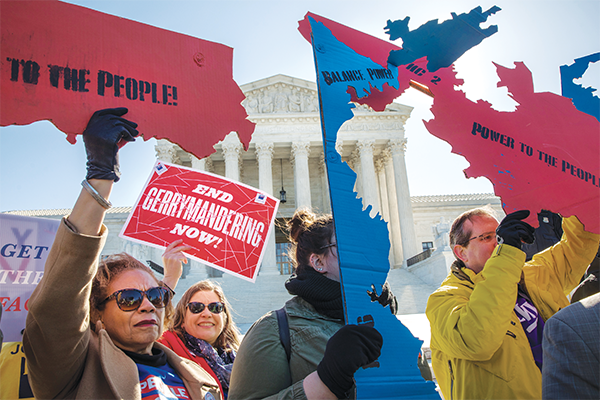SINCE PRESIDENT TRUMP urged Texas lawmakers to get him “five more seats” in the House of Representatives before the 2026 mid-term elections, the words “redistricting” and “gerrymandering” have grabbed news headlines. Texas has redrawn congressional districts to give the Republican party an advantage. California is leading a countermove to redraw districts to give Democrats an edge. Other states are considering similar ploys along partisan lines.
Redistricting is the process of revising the boundaries of districts from which legislators are elected. Normally, redistricting takes place once a decade following the national census. Using new data on population changes and racial diversity, each state is required to redraw voting districts to provide balanced populations for congressional and state representation.
Gerrymandering happens when redistricting goes rogue. The word dates from 1812, when Massachusetts Gov. Elbridge Gerry permitted a congressional district map drawn to benefit his own party. One district, shaped like a monstrous salamander, caught press attention. Ever since, distorted districts have been called “Gerry-manders.”
More recently, advanced data mining and mapping technologies have made the manipulation of districts for partisan advantage even more effective in controlling electoral outcomes. Oddly shaped districts slice through counties and communities to divide voters from one party into irrelevant minorities, allowing voters of the party in power to gain more legislative seats.
Several years ago, I saw this happening in my own state of Pennsylvania. As a youth pastor, I became alarmed at the stark inequity in my state’s school funding. I soon learned that the political leaders who drew the district lines too often used those lines to manipulate the legislative process. Gerrymandering districts allowed them to ignore the needs of their constituents and advance the agendas of their top donors.
One former legislator told me, “Gerrymandering is the key to corruption and control.” Another, who ran for office to further fair school funding, insisted: “Until we fix redistricting, we’ll never fix the other issues that keep poor people poor.”
Following the 2011 redistricting process, Pennsylvania was among the most badly gerrymandered states in the nation. In 2016, I helped launch Fair Districts PA, a grassroots, nonpartisan coalition in support of redistricting reform. Through grassroots organizing, public attention, and advocacy ahead of the 2021 redistricting process, Pennsylvania now has better maps for the current decade. While we have not yet convinced legislative leaders to give redistricting reform bills a final vote, a fairly evenly divided state legislature protects Pennsylvania from the current mid-decade redistricting wars.
Gerrymandering allows politicians to choose their voters, rather than voters choosing their politicians.
Gerrymandering is most often described as a power play between the political parties, but it is also, always, an assault on democratic representation. Distorted districts deprive all voters of a voice, treating citizens as pawns in a cynical partisan game rather than as active agents in effective self-governance.
Currently, 11 states ban mid-decade redistricting. But a growing number of states will have new gerrymandered maps in 2026 unless the U.S. Supreme Court intervenes. A high court ruling is unlikely, following a 2019 ruling that concluded partisan gerrymandering was “beyond the reach” of federal courts.
As this partisan battle escalates, voters across the political spectrum are asking: Does my vote matter? Younger Americans, in alarming numbers, wonder if there’s a future in democracy. A recent large national poll by NBC indicates a strong majority of Americans (82%) would prefer that district lines are drawn by independent commissions. For years, state and national polls have indicated general public agreement that gerrymandering is wrong, no matter who does it. It erodes trust in our democratic system.
In more than a decade of work on fair redistricting, I’ve learned that gerrymandering deprives voters of a real choice, no matter their party affiliation. It allows politicians to choose their voters, rather than voters choosing their politicians. To counter this, several nonpartisan groups, such as Fair Districts PA, League of Women Voters, and Common Cause, work on redistricting reform in every state where gerrymandering is possible.
Amid the current gerrymander wars, congressional representatives from California introduced redistricting reform bills this fall. House Republican Kevin Kiley introduced H.R. 4889 “to prohibit states from carrying out more than one Congressional redistricting” after the census. This would prevent mid-decade redistricting but do nothing to prevent gerrymandered districts. Senate Democrat Alex Padilla and House Democrat Zoe Lofgren introduced the bicameral Redistricting Reform Act, which would block mid-decade redistricting and require independent redistricting commissions in every state.
In the 10 years I’ve been working on this issue, I’ve discovered many legislators, organizations, congregations, and people of faith working hard for political solutions that are never realized, in large part because of the broken link between voters and legislative process. At Fair Districts PA, we constantly remind one another that “redistricting isn’t the thing we want to fix most. It’s the thing we have to fix first.”

Got something to say about what you're reading? We value your feedback!





